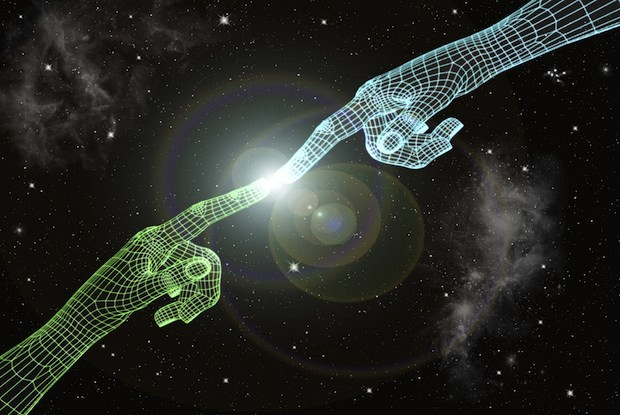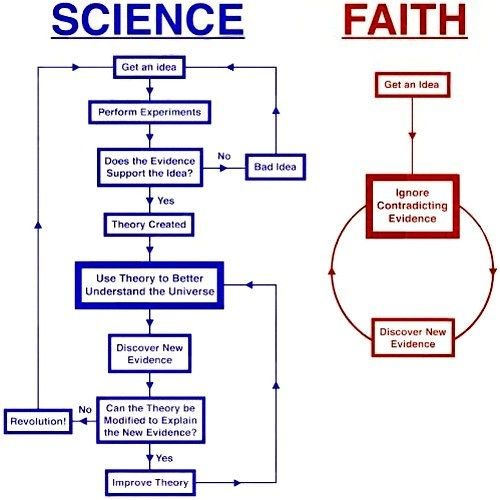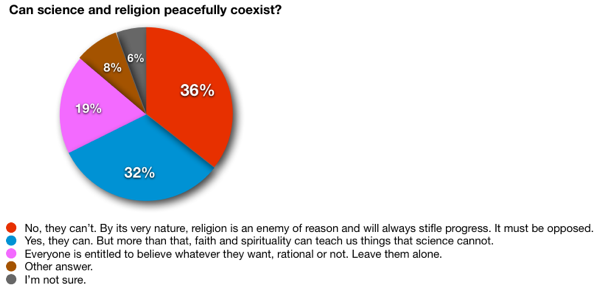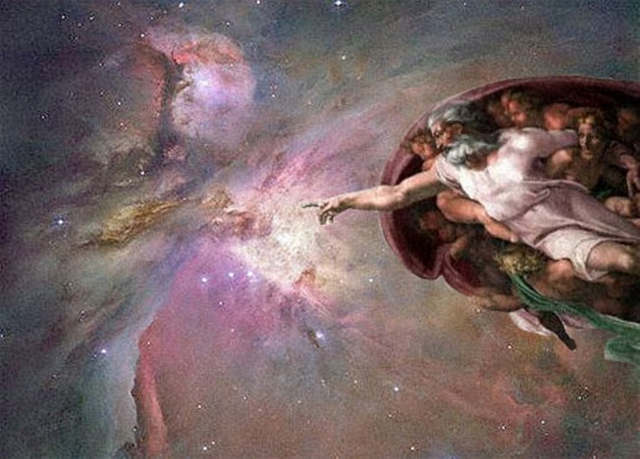Faith Versus Fact : Can science coexist with religion?

In May 1988, a thirteen-year-old girl named Ashley King was sent to the Phoenix Children's Hospital (capital of Arizona) by court order. She had a swelling in her leg - an osteogenic sarcoma - which, according to Jerry Coyne in her book Faith Versus Fact, was "more of a basketball." Because of her, the girl's leg began to rot, and her body began to refuse. However, Ashley's parents - adherents of Christian science - did not consent to amputation, and instead they placed her daughter in a Christian scientific sanatorium where, according to the principles of their faith, "there was no medical help, even painkillers." They organized a collective prayer to help her daughter, but this did not lead to anything. Three weeks later, the girl died.
If Ashley received medical attention, Coyne wrote, she probably would have survived. The King's spouses, accused by the Arizona court of murder by imprudence, did not express any remorse, did not file an objection on the suit, and were eventually convicted on less charges. They managed to escape punishment, since their actions were motivated by faith.
"If the King's were atheists, Ashley could survive," writes Coyne
This tragic story takes us back to the main argument of Coyne, an evolutionary biologist at the University of Chicago, presented in his book:
"... it is time to stop seeing faith as a virtue and stop using the term" man of faith "as a compliment"
On 262 pages of his book, Coyne disputes the statement that belief in God is a commendable quality, and describes the reasons why faith is fatal, even dangerous and fundamentally incompatible with science, while peacekeepers are trying to find something in common between them. It is worth noting that Coyne devoted most of his career to challenging the rejection of religion from Darwinism - he published the bestseller Why Evolution Is True, based on his blog with the same title. In Faith Versus Fact, his main argument was that both science and religion describe the universe, but only one of the two institutions is open enough to admit that his statements may be false.
In a calm and judicious manner, Koyne disproves the "adaptive" stance that science and religion are "two disjoint areas" - a theory put forward by his colleague Stephen Jay Gould that states that science deals with factual information about the physical universe, while religion deepens in spiritual moments, from which it follows that they can not conflict with each other. Their combination is impossible, he writes, because the religious "combination of confidence, morality and thought of universal punishment are poisonous." Science on the contrary recognizes the fact that it can be mistaken, and comes to "truths" that are "approximate and based only on some evidence base," but at least they can be verified. Unlike religion, science independently corrects itself, finds errors and tries again.

Faith Versus Fact appeared at a time when the number of unbelievers grew among young Americans. A recent Pew poll showed that 34% of the generation of two thousand people do not consider themselves to be any religion, compared to 25% in 2007. But in general, Americans are still religious: 70.6% of Christians in 2014. Of this group, the majority (25.4%) are identified as Evangelical Christians (Protestants), and the study shows that in the last seven years their number has decreased less than the number of followers of other faiths (Protestants have a 0.9% decline and Catholics have 3 ,1%).
One of the most significant examples of the conflict between religion and science is the issue of global warming, and Coyne carefully emphasizes the religious origin of the arguments against the fact of climate change. He refers to the statement by Rick Santorum that all this is a "false rumor", as well as the speech of the representative of Illinois John Shimkus before the Subcommittee on Energy and Environment of the House of Representatives in 2009, based on the Bible. Koyne writes that religion and denialism (the irrational denial of a firmly established fact) of climate change are inextricably linked, because religious people faithfully believe in "God's guidance of this planet and his promise to preserve it until he comes back." But his book was published before Pope Francis published an encyclical (the main papal document on important issues addressed to believers or bishops or archbishops of a particular country, and second in importance after the apostolic constitution - note by Newochem) about environmental problems in June, in which he warned that "climate change is a global problem with serious consequences." (The pope was loudly criticized for this, but many religious leaders agreed with him, which somewhat undermines Koin's argument). But it remains obvious that some conservatives in the US deny climate change, relying on their faith.
But first of all, Coyne focuses on the theory of knowledge. He notes that religion has always put forward hypotheses about the cosmos and the origin of life - issues that in its opinion belong to the scientific sphere. He sharply assesses religious opinions about the universe as "the failure of religion in an attempt to find the truth about anything." Worse, religion from the very beginning leads humanity to "the idea that an adequate explanation can be based more on something personal than on what can stand the test by empirical research."
Koyne clearly states that there is no need for the "Creator" to understand the cosmos. The fact that science speaks of the origin of our solar system makes the existence of a "divine plan" for humanity even more incredible. "Human life on Earth will end when the Sun ... will evaporate the Earth in less than five billion years," he writes, and the Universe "will eventually end up in a" thermal death "- the temperature will drop to absolute zero. What does this say about those who insist on the existence of a divine plan for humanity on Earth? The "God of Blank Spots" loses its positions, whereas science "fills white spots".
Such a rational understanding of life may seem cold. But Koyne is not heartless and admits that religion can give people comfort.
"Your grandmother is on his deathbed and is comforted by the thought that he will soon be in heaven, where he will reunite with the deceased husband and ancestors. You do not believe this, but do not be silent. What's wrong with that? "
Of course, nothing. But there is no guarantee that faith will always be able to alleviate the pain, as was the case with Ashley King.

Believers often argue that faith is necessary in order to accept incredible, sometimes ambiguous and often incomprehensible scientific conclusions. Koyne rejects this "attempt to" translate arrows "as a way of saying" science is as bad as religion ", which in fact is an argument not in favor of the latter. The advocates of religion also mention good deeds done by religious people. But the fact that faith pushes people to good deeds will not undo the harm it brings. Coyne writes:
"At least we have plausible explanations of all forms of altruism, from the least burdensome to the most sacrificial"

Koin's rational research is opposed to the popular, often "lazy" ideas promoted by relativists such as Reza Aslan and Karen Armstrong. Aslan, for example, argues that the Quran should not be taken literally, but as a "sacred story" and a metaphor. He even said that "it does not matter ... exactly what words God sent to the mouth of Muhammad." Coyne noted that "for such a statement, made public in some Muslim countries, they can kill." Moreover, the idea that the Bible can be an allegory "somehow escaped the servants of the church and theologians for centuries."
If there is a question that Faith Versus Fact should take a deeper look at, it's like people who are once far from religion, should perceive an amazing religious cultural heritage, from literature and music to painting and architecture. He only considers art in the context of his unfitness as a means of knowing the truth about the material world, because, as he writes, "there are not enough tools to consider this issue." Works of art "can propel us to something, even change, but do they give truth or knowledge?". But he also made digressions, telling about his reaction to them, demonstrating that he has a heart and he is not just a "cold scientist".

Faith Versus Fact can serve as an example for non-believers who want to explain their point of view to believers, as well as help doubters in trying to solve theistic dilemmas about themselves. Atheists can hope that the book will challenge believers, refuting the arguments in favor of the merits of religion and its authenticity. But as the book shows, as well as the reaction to the previous atheistic disputes of Sam Harris, Richard Dawkins and Christopher Hitchens, devoutly believing people will not change their opinion. Science can rest on the basis of rational thinking or trial and error, but the roots of religion lie in something more unpredictable, which makes it much harder to resist.
References for Text and Images:
- https://www.pinterest.com/explore/science-vs-religion/
- https://www.pinterest.com/explore/science-vs-religion/
- http://thewisdomdaily.com/whether-scientific-or-religious-or-both-were-all-human/
- https://sciart.eu/en/2012-01-16-0501/156/science-religion-and-spirituality
- http://www.patheos.com/blogs/ecopreacher/2017/04/religion-science-besties/
Support @steemstem and the #steemstem
project - curating and supporting quality STEM
related content on Steemit

nice article. good to know that I am not the only one who thinks that science and faith colide with each other
I think at least for the story is more of a case of close minded stupidity. I don't think science and religion are exclusives. Just like creation vs evolution. People think if one was true the other can't be, but what if there is a God and evolution was how he created everything? God is said to have no sense of time, so to him 7 days could be any length of time, who really knew how to measure it. We know dinosaurs walked the earth but not really in the same time period that man did, so what if those 7 days were really 7 million years or billion years where life evolved and became what is known to man. Believing God will fix all problems with out any involvement is idiotic. God gave us the ability to learn and adapt and come up with new sciences to further advance our race. Use what is given to us. God has done very little in the grand scheme of things compared to biblical times. It is also said he doesn't help those that don't help themselves.
The incompatibility between science and religion does not stem from the possibility of the existence of a god, it comes from the fact that science is a method that does not take into account your feelings or opinions. What is proven by science is still true wether you believe in it or not.
You reasoning about creation could be extended to anything without any fact supporting it, so it cannot be proven wrong in return either. You can modify your belief at will to make it fit with what you see. Now if tomorrow we have proofs that Humans were created by an ancient civilization of giant slugs, you will say "yes but what if God created the ancient slugs to create us in turn ?".
very good post
Congratulations @mike11, this post is the second most rewarded post (based on pending payouts) in the last 12 hours written by a Newbie account holder (accounts that hold between 0.01 and 0.1 Mega Vests). The total number of posts by newbie account holders during this period was 4867 and the total pending payments to posts in this category was $4765.73. To see the full list of highest paid posts across all accounts categories, click here.
If you do not wish to receive these messages in future, please reply stop to this comment.
Very eye opening read!
In my opinion...... religion is like an art (beautiful)...... but, this article just discuss about the extreme of believer and nonbeliever.... I guess..... but, great article btw......
Nice post, it sounds like an interesting book to read. interesting also is that the author starts as 'her' and is later a 'him' in your piece. And his/her name is spelled three different ways. Coyne, Koyne, Koin.
Great work here, i wanted to write an article on the subject but you said almost everything already. There is no doubt for me on the incompatibility of science and religion, and people who pretend that "religion deals with what science cannot explain" just have their heads in the sand and try not to offend anyone.
I think the main question now is just how scientists should communicate with religious people, as i agree that religious ideas do not deserve any particular treatment or respect, we should respect people even if they are wrong.